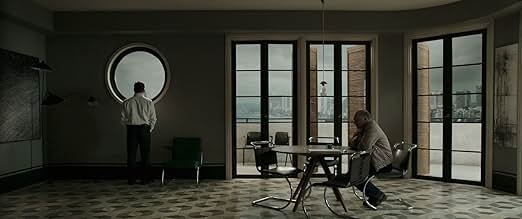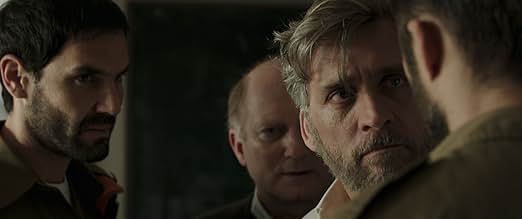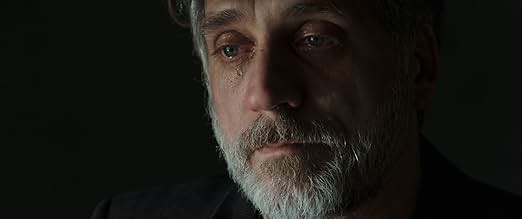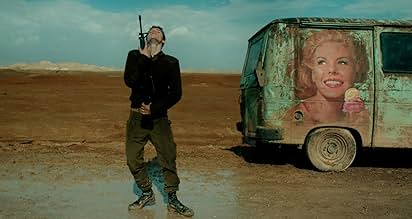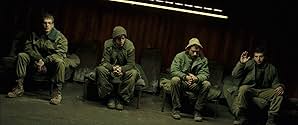AVALIAÇÃO DA IMDb
7,2/10
8,3 mil
SUA AVALIAÇÃO
Adicionar um enredo no seu idiomaA troubled family must face the facts when something goes terribly wrong at their son's desolate military post.A troubled family must face the facts when something goes terribly wrong at their son's desolate military post.A troubled family must face the facts when something goes terribly wrong at their son's desolate military post.
- Prêmios
- 21 vitórias e 25 indicações no total
Yonatan Shiray
- Jonathan
- (as Yonathan Shiray)
Itay Exlroad
- Dancer Soldier
- (as Etay Axelroad)
Arie Tcherner
- High Ranking Officer
- (as Aryeh Cherner)
Avaliações em destaque
This highly acclaimed drama from Israel is a thoughtful and deep reflection on how we perceive of the scars that grief and guilt can leave on us. The film follows a patriarch and his wife who are told at the beginning of the film by Israeli army officers that their son was killed in the line of duty. These two parents begin to embark on a seemingly hellish grieving process...for the first 30 minutes. I won't give away what happens next, but the film ends up taking a variety of unique twists and turns through three distinct parts similar to that of a triptych-style narrative. It's not quite what you think it is, that's for sure.
The acting in the film is consistently excellent, particularly the performance of the father. He manages to engage the audience in his seething feelings of sadness and an almost-primal sensation of rage, while still feeling uniquely down-to-earth and relatable. This is an almost impossible trick to pull off. Samuel Maoz clearly knows how to write thoughtful analysis of the society and people of Israel, with a clockwork level of precision--and props to him for that. The pacing in the film's three acts, however, could have been improved and can feel somewhat erratic in the movie's second half. Additionally, the finale of the movie is done in a somewhat peculiar manner that falls a bit short of what would most satisfy the viewer in terms of wrapping up the story. Still, I definitely recommend "Foxtrot" to those interested and thought this was quite a well-made film at the end of the day. 7.5/10
The acting in the film is consistently excellent, particularly the performance of the father. He manages to engage the audience in his seething feelings of sadness and an almost-primal sensation of rage, while still feeling uniquely down-to-earth and relatable. This is an almost impossible trick to pull off. Samuel Maoz clearly knows how to write thoughtful analysis of the society and people of Israel, with a clockwork level of precision--and props to him for that. The pacing in the film's three acts, however, could have been improved and can feel somewhat erratic in the movie's second half. Additionally, the finale of the movie is done in a somewhat peculiar manner that falls a bit short of what would most satisfy the viewer in terms of wrapping up the story. Still, I definitely recommend "Foxtrot" to those interested and thought this was quite a well-made film at the end of the day. 7.5/10
The theme 'war is absurd' has become a cliché that tests the creativity of many a filmmaker. How many ways can you represent the random chaos of shattered lives and senseless destruction? The emotional rollercoaster Foxtrot (2017) hits the high-watermark in originality for the way it deploys grief, social critique, and absurdism to show a different side of war.
The film's four acts defy the conventions of linear storytelling. In the opening seconds, a mother (Sara Adler) sees three soldiers at the door and before they can speak she collapses to the ground. With military precision, the doctor among them administers sedation and tells the father (Lior Askhkenazi) she will sleep for five hours; that's usual, they say. When a son has fallen in the line of duty they expect the father to cope. They leave; another comes to plan just another funeral; then alone, the father furiously paces like a caged beast, crushed by his own emotions. In five hours they return with totally different news.
That plotline alone could fill a movie, but it is merely the first step of an absurdist dance with chaos that goes forward, across, back, then returns to the beginning. In the second act we meet the very much alive son Jonathan (Yonaton Shiray) who is stationed on an isolated checkpoint where the only intruders are camels that have trained the guards to open the boom-gate to let them pass. Bored out of their minds, the four teenage warriors tell each other stories, punctuated by Jonathan's memorable foxtrot dance with his rifle as partner. The third and final acts complete this case study of random chaos; they include a scene one year later where the mother and father commiserate a tragedy and a dissolving marriage. The final seconds of the film match the opening in the way they erupt with the unexpected.
Undoubtedly, this film is anchored by the first 45 minutes in which Lior Askhkenazi gives a tour-de-force performance of going to hell and back. It is also a forensic satire that is beyond war clichés and that has infuriated the Israeli Military establishment. So much is being said in this film, with so few words spent. Small moments are jarring: like a father being told casually that his fallen son was promoted posthumously, as if he is worth more dead than alive, or the mechanically detailed way the military deals with death and bereavement. The camerawork and colour palette superbly set the mood of each act, and the asymmetry of the narrative reflects an alternative and absurdist universe in which war is normalised.
This is powerful cinema, the kind that can sweep you up with its characters, emotions, and story. Then, at the end of the film when the dance is done, you are left in disbelief at the banality of humanity. Watch for Foxtrotin Best Foreign Film award.
The film's four acts defy the conventions of linear storytelling. In the opening seconds, a mother (Sara Adler) sees three soldiers at the door and before they can speak she collapses to the ground. With military precision, the doctor among them administers sedation and tells the father (Lior Askhkenazi) she will sleep for five hours; that's usual, they say. When a son has fallen in the line of duty they expect the father to cope. They leave; another comes to plan just another funeral; then alone, the father furiously paces like a caged beast, crushed by his own emotions. In five hours they return with totally different news.
That plotline alone could fill a movie, but it is merely the first step of an absurdist dance with chaos that goes forward, across, back, then returns to the beginning. In the second act we meet the very much alive son Jonathan (Yonaton Shiray) who is stationed on an isolated checkpoint where the only intruders are camels that have trained the guards to open the boom-gate to let them pass. Bored out of their minds, the four teenage warriors tell each other stories, punctuated by Jonathan's memorable foxtrot dance with his rifle as partner. The third and final acts complete this case study of random chaos; they include a scene one year later where the mother and father commiserate a tragedy and a dissolving marriage. The final seconds of the film match the opening in the way they erupt with the unexpected.
Undoubtedly, this film is anchored by the first 45 minutes in which Lior Askhkenazi gives a tour-de-force performance of going to hell and back. It is also a forensic satire that is beyond war clichés and that has infuriated the Israeli Military establishment. So much is being said in this film, with so few words spent. Small moments are jarring: like a father being told casually that his fallen son was promoted posthumously, as if he is worth more dead than alive, or the mechanically detailed way the military deals with death and bereavement. The camerawork and colour palette superbly set the mood of each act, and the asymmetry of the narrative reflects an alternative and absurdist universe in which war is normalised.
This is powerful cinema, the kind that can sweep you up with its characters, emotions, and story. Then, at the end of the film when the dance is done, you are left in disbelief at the banality of humanity. Watch for Foxtrotin Best Foreign Film award.
I've been expecting to see faster happenings in the movie, but no, I did not. As one drama, it is good in those segments where you can follow the main character's expressions, but on the other hand it is a bit boring because he is not the only character in it and almost all the rest are unconvincing actors. From time to time a director gives us pieces of black humor and that intention drives us not to be rigorous in giving comments. It is specifically in those scenes with four soldiers in shipping container, that is slowly sinking into the muck, and in which they are located to be while guarding the border. The best two things of the movie are those shots made from above and that little cartoon where we can see the story about what happened in the past and why. From my point of view, it is worth seeing, but it is not the perfect masterpiece as we wanted to see.
The methaphorical depiction of the futile repetition of war suggested by the 'Foxtrot' title deserved a better examination than this poorly acted, tedious & ultimately unconvincing movie. Even the several Foxtrot dance scenes themselves were stilted & out of place - ditto the videos of murmations of starling flocks clumsily inserted into the cinematography. In theory the plot contained a powerful narrative of the harrowing wartime experiences of the father being repeated by his conscript son but this was lost in the overly tedious & sometimes completely pointless plot - as in the scenes involving a soft-adult magazine also handed down from father to son - which just reduced the movie's important themes to comic book farce. Things improved significantly in the third act of the movie only to be deflated again by the weak final scene (..no spoilers..) It could have been so much better.
Greetings again from the darkness. The most dreaded knock on the door. Every parent or spouse of someone who has served their country during war time fully understands that indescribable feeling of opening the door and seeing uniformed soldiers waiting to deliver the worst possible news. That knock is how Israeli writer/director Samuel Maoz (LEBANON, 2009) chooses to open his film. Knowing her son Daniel is dead sends Daphna (Sarah Adler) into hysterics, and the experienced messengers know to administer something to help her relax and sleep. Her husband Michael (Lior Ashkenazi, FOOTNOTE) stands stunned, mostly unable to respond.
What follows is one of the most stunning first Act performances we've seen on the big screen. That is not hyperbole. Mr. Ashkenazi is remarkable over the first approximately 20 minutes as a parent in shock, experiencing devastating grief. The news is debilitating to his physical and mental being. Additionally, the filmmaking during this segment is quite something to behold. The close-ups add a heavy dose of humanity, while the terrific overhead camera angle presents Michael as trapped, while also adding to the disorientation that is so key. The one-hour alarm set to remind him to "drink some water" would be humorous if not for the fact that its structure prevents the man from totally breaking down.
The second Act takes us away from Daphna's and Michael's contemporary Tel Aviv apartment and plops us into a remote military outpost where 4 young soldiers are charged with guarding a road passage. Thanks to this boring assignment, the young men find ways of adding interest to their days: timing canned goods that roll down the ever-increasing slope of their sinking-in-the-muck domicile container, raising the bar for the periodic camel that lopes by, and giving the rare passers-by a bit of a hard time as their ID's are checked. 'Of course, this is war territory, so when something goes wrong, it goes terribly and horrifically wrong.
Our final Act takes us back to the original apartment as Michael, Daphna and their daughter are working to reconcile their feelings and somehow re-assemble the pieces of their shattered lives ... though the shifts from that heartbreaking first Act are what sets the script apart from so many movies. Cinematographer Giora Bejach continues the exemplary camera work during this curious segment that leaves us feeling somewhat uncertain at first.
This family is stuck in the war that never ends. Like so many in the area, they carry burdens, guilt and grief that, like the war, also never ends. That first Act is transcendent filmmaking and acting, and the three acts work together as a prime example of the melding of visual and emotional storytelling. Most of the film takes place in one of two locales, and it's the subtleties in each shot that tell us what we must know. And yes, the foxtrot dance does play a role, but like most of this film, it's best discovered on your own.
What follows is one of the most stunning first Act performances we've seen on the big screen. That is not hyperbole. Mr. Ashkenazi is remarkable over the first approximately 20 minutes as a parent in shock, experiencing devastating grief. The news is debilitating to his physical and mental being. Additionally, the filmmaking during this segment is quite something to behold. The close-ups add a heavy dose of humanity, while the terrific overhead camera angle presents Michael as trapped, while also adding to the disorientation that is so key. The one-hour alarm set to remind him to "drink some water" would be humorous if not for the fact that its structure prevents the man from totally breaking down.
The second Act takes us away from Daphna's and Michael's contemporary Tel Aviv apartment and plops us into a remote military outpost where 4 young soldiers are charged with guarding a road passage. Thanks to this boring assignment, the young men find ways of adding interest to their days: timing canned goods that roll down the ever-increasing slope of their sinking-in-the-muck domicile container, raising the bar for the periodic camel that lopes by, and giving the rare passers-by a bit of a hard time as their ID's are checked. 'Of course, this is war territory, so when something goes wrong, it goes terribly and horrifically wrong.
Our final Act takes us back to the original apartment as Michael, Daphna and their daughter are working to reconcile their feelings and somehow re-assemble the pieces of their shattered lives ... though the shifts from that heartbreaking first Act are what sets the script apart from so many movies. Cinematographer Giora Bejach continues the exemplary camera work during this curious segment that leaves us feeling somewhat uncertain at first.
This family is stuck in the war that never ends. Like so many in the area, they carry burdens, guilt and grief that, like the war, also never ends. That first Act is transcendent filmmaking and acting, and the three acts work together as a prime example of the melding of visual and emotional storytelling. Most of the film takes place in one of two locales, and it's the subtleties in each shot that tell us what we must know. And yes, the foxtrot dance does play a role, but like most of this film, it's best discovered on your own.
Você sabia?
- CuriosidadesAccording to Samuel Maoz, the film was conceived as three episodes: The first sequence should shock and shake, the second should hypnotize, and the third should be moving.
- ConexõesReferences Uma Cilada para Roger Rabbit (1988)
- Trilhas sonorasNever Been
Performed by Betzefer
Principais escolhas
Faça login para avaliar e ver a lista de recomendações personalizadas
- How long is Foxtrot?Fornecido pela Alexa
Detalhes
Bilheteria
- Faturamento bruto nos EUA e Canadá
- US$ 618.883
- Fim de semana de estreia nos EUA e Canadá
- US$ 31.629
- 4 de mar. de 2018
- Faturamento bruto mundial
- US$ 1.356.159
- Tempo de duração1 hora 53 minutos
- Cor
- Mixagem de som
- Proporção
- 2.35 : 1
Contribua para esta página
Sugerir uma alteração ou adicionar conteúdo ausente



